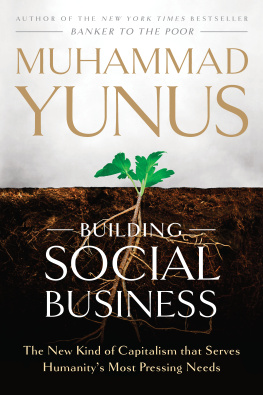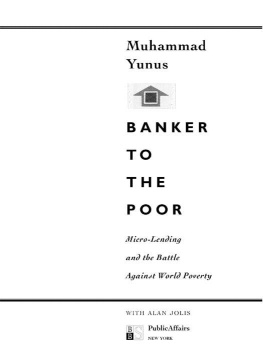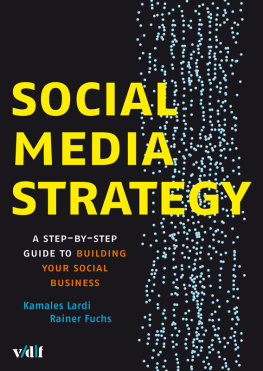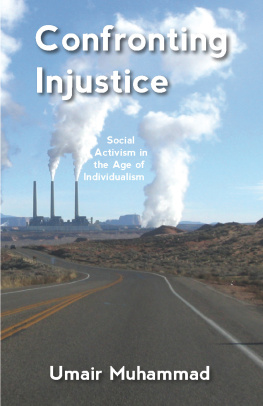Muhammad Yunus - Building Social Business
Here you can read online Muhammad Yunus - Building Social Business full text of the book (entire story) in english for free. Download pdf and epub, get meaning, cover and reviews about this ebook. year: 2011, publisher: PublicAffairs, genre: Business. Description of the work, (preface) as well as reviews are available. Best literature library LitArk.com created for fans of good reading and offers a wide selection of genres:
Romance novel
Science fiction
Adventure
Detective
Science
History
Home and family
Prose
Art
Politics
Computer
Non-fiction
Religion
Business
Children
Humor
Choose a favorite category and find really read worthwhile books. Enjoy immersion in the world of imagination, feel the emotions of the characters or learn something new for yourself, make an fascinating discovery.
- Book:Building Social Business
- Author:
- Publisher:PublicAffairs
- Genre:
- Year:2011
- Rating:5 / 5
- Favourites:Add to favourites
- Your mark:
- 100
- 1
- 2
- 3
- 4
- 5
Building Social Business: summary, description and annotation
We offer to read an annotation, description, summary or preface (depends on what the author of the book "Building Social Business" wrote himself). If you haven't found the necessary information about the book — write in the comments, we will try to find it.
Building Social Business — read online for free the complete book (whole text) full work
Below is the text of the book, divided by pages. System saving the place of the last page read, allows you to conveniently read the book "Building Social Business" online for free, without having to search again every time where you left off. Put a bookmark, and you can go to the page where you finished reading at any time.
Font size:
Interval:
Bookmark:
SOCIAL
BUSINESS
ALSO BY MUHAMMAD YUNUS
Banker to the Poor
Creating a World Without Poverty
SOCIAL
BUSINESS

that Serves Humanitys
Most Pressing Needs

with Karl Weber


To all those who are ready to
dedicate themselves to change the world

Copyright 2010 by Muhammad Yunus.
Published in the United States by PublicAffairs,
a member of the Perseus Books Group.
All rights reserved.
Printed in the United States of America.
No part of this book may be reproduced in any manner whatsoever without
written permission except in the case of brief quotations embodied in critical
articles and reviews. For information, address PublicAffairs, 250 West 57th
Street, Suite 1321, New York, NY 10107.
PublicAffairs books are available at special discounts for bulk purchases in the
U.S. by corporations, institutions, and other organizations. For more
information, please contact the Special Markets Department at the Perseus
Books Group, 2300 Chestnut Street, Suite 200, Philadelphia, PA 19103, call
(800) 810-4145, ext. 5000, or e-mail .
Book Design by Brent Wilcox
Library of Congress Cataloging-in-Publication Data
Yunus, Muhammad, 1940
Building social business : the new kind of capitalism that serves humanitys most pressing needs / Muhammad Yunus with Karl Weber.
p. cm.
Includes index.
ISBN 978-1-58648-824-6 (hardcover)
eBook ISBN: 9781586488635
1. Social responsibility of business. 2. Social entrepreneurship.
3. CapitalismMoral and ethical aspects. I. Weber, Karl, 1953- II. Title.
HD60.Y85 2010
658.4'07dc22
2010002857
First Edition
10 9 8 7 6 5 4 3 2 1
Social BusinessFrom Dream to Reality
I first got involved in the poverty problem as an academician, and then personally, almost by accident. I got involved because poverty was all around me in Bangladesh. In particular, the famine of 1974 pushed me out of the university campus and forced me to become a social activist in addition to being a teacher.
This is a common experience, of course. In disaster situations, most of us without hesitation take up the social roles demanded by human compassion. But in my case what began in a time of crisis became a lifelong calling. I gave up my academic position and founded a banka bank for the poor.
It was the first step in a journey that continues to this day. The latest stage in that journey, as Ill explain in this book, is creating and realizing an idea for a new form of capitalism and a new kind of enterprise based on the selflessness of people, which I call social business. Its a kind of business dedicated to solving social, economic, and environmental problems that have long plagued humankindhunger, homelessness, disease, pollution, ignorance.
Back in the early seventies, the newly independent country of Bangladesh was in a terrible state. The aftermath of our War of Liberationwith the destruction caused by the Pakistani armycombined with floods, droughts, and monsoons to create a desperate situation for millions of people. Then came the famine. I found it increasingly difficult to teach elegant theories of economics in the classroom while a terrible famine was raging outside. Suddenly I felt the emptiness of traditional economic concepts in the face of crushing hunger and poverty. I realized that I had to be with the distressed people of Jobra, the neighboring village just outside of Chittagong University, and somehow find something to do for them. All that I hoped to do was make myself useful to at least one person per day.
In trying to discover what I could do to help, I learned many things about Jobra, about the poor people who lived there, and about their helplessness. I came face to face with the struggle of the poor to find the tiniest amounts of money needed to support their efforts to eke out a living.
In particular, I was shocked to meet a woman who had borrowed just 5 taka (the equivalent of around 7 cents in U.S. currency) from a moneylender and trader. She needed this small amount of money to buy bamboo, from which she crafted stools to sell. The interest rate on such loans was very highas much as 10 percent per week. But still worse was the special condition imposed on the loan: She would have to sell all her products to the moneylender at a price he would determine.
That 5-taka loan transformed her into a virtual slave. No matter how hard she might work, she and her family could never escape from poverty.
To understand the scope of this moneylending practice in the village, I made a list of the people who had borrowed from the moneylenders. When my list was complete, it had forty-two names. These people had borrowed a total of 856 taka from the moneylendersroughly U.S. $27 at then-current exchange rates. It seemed absurd that such a small amount of money should have created so much misery!
To free these forty-two people from the clutches of the moneylenders, I reached into my own pocket and gave them the money to repay the loans. The excitement that was created in the village by this small action touched me deeply. I thought, If this little action makes so many people so happy, why shouldnt I do more of this?
Thats what I have been trying to do ever since.
The first thing I did was to try to persuade the bank located in the university campus to lend money to the poor. But the bank manager refused. He said, The poor do not qualify to receive loans from the bankthey are not creditworthy. I argued with him with no result. I met with senior banking officials at various levels to see if I could find someone who would be willing to open the doors of the bank to the poor. This went on for several months, but I couldnt change their minds.
Finally, I came up with an idea. I offered to become a guarantor for loans to the poor. After much hesitation, the bank agreed to accept this proposal. By the middle of 1976, I started giving out loans to the village poor, signing all the papers the bank gave me to guarantee the loans personally and acting as a kind of informal banker on my own. I wanted to make sure that the poor borrowers would find it easy to pay back the loans, so I came up with simple rules, such as having people repay their loans in small weekly amounts, and having the bank officer visit the villagers rather than making the villagers visit the bank. These ideas worked. People paid back the loans on time, every time.
It seemed to me that lending money to the poor was not as difficult as was generally imagined. It even appeared to me that serving their financial needs might be a viable business. Youd think a smart banker would be able to recognize this opportunity quicker than a mere economics professor with no banking experience. But no. I kept confronting difficulties in trying to expand the program through existing banks.
Font size:
Interval:
Bookmark:
Similar books «Building Social Business»
Look at similar books to Building Social Business. We have selected literature similar in name and meaning in the hope of providing readers with more options to find new, interesting, not yet read works.
Discussion, reviews of the book Building Social Business and just readers' own opinions. Leave your comments, write what you think about the work, its meaning or the main characters. Specify what exactly you liked and what you didn't like, and why you think so.








